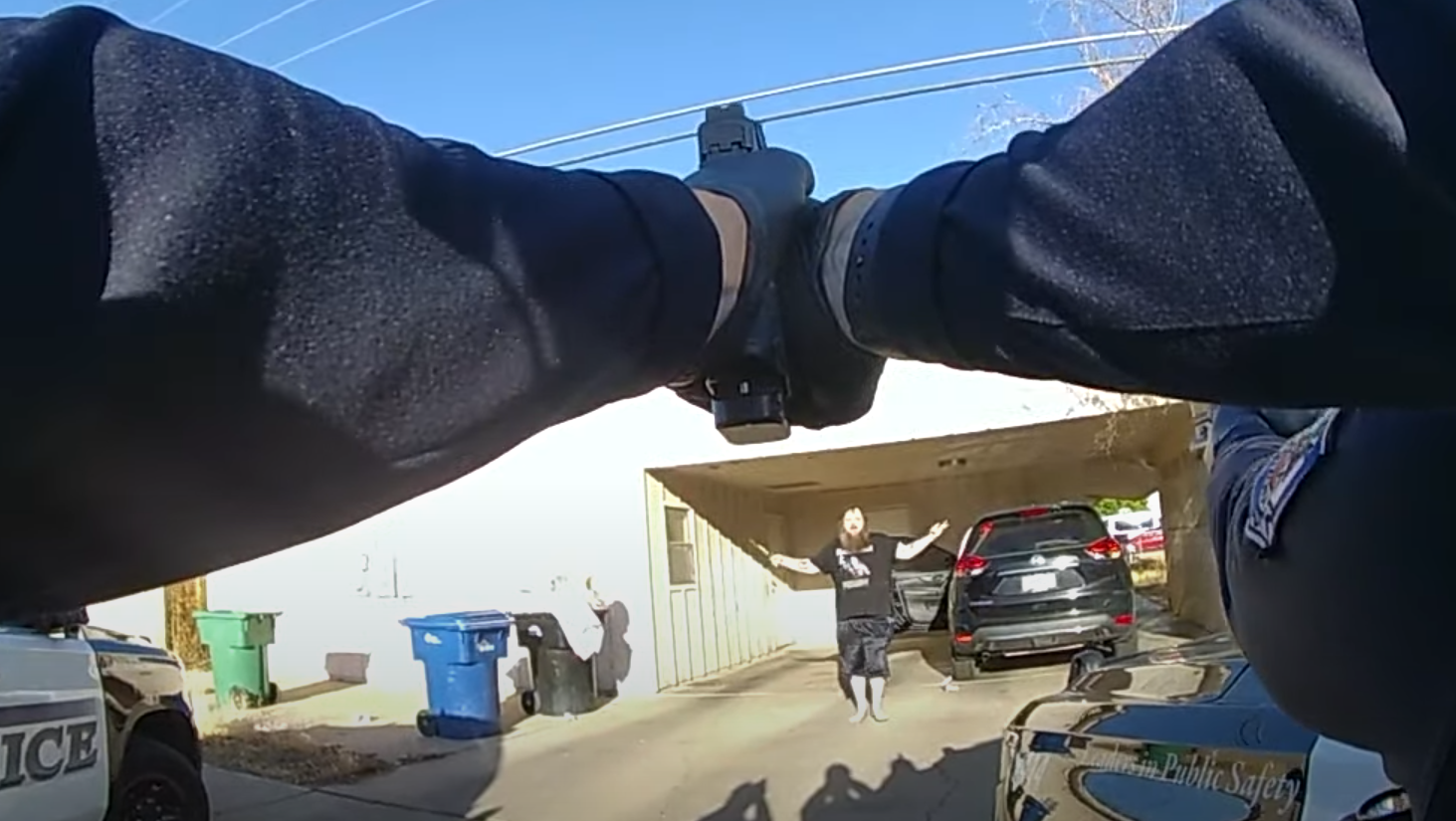
Mesa Police Department

Audio By Carbonatix
Thomas McGinty’s attempt to kill himself with exhaust fumes last year was unsuccessful. But, according to a wrongful death lawsuit filed Sept. 27 in Maricopa County Superior Court, Mesa police officers finished what McGinty started.
The lawsuit, brought against the city by McGinty’s widow, Holly, concerns the events of Sept. 29, 2023. According to the suit, McGinty’s daughter called 911 after finding her father in his car with a hose running from the exhaust pipe into the cabin. A neighbor and Holly McGinty also called police, the latter noting that McGinty did not have access to a gun.
But when Mesa police officers arrived at the family’s home, they wound up shooting and killing McGinty instead of preventing his suicide.
“As this matter involves pending litigation, we are unable to provide a comment on the lawsuit at this time,” Mesa police public information officer Richard Encinas said in a statement to Phoenix New Times.
According to a police report from the incident, McGinty had a history of mental health issues and had previously stated to family members that he was going to kill himself. Before trying to suffocate himself in his car, he had planned to use a gun, which his family took from him, his daughter and wife told police after McGinty’s death.
When McGinty’s daughter found him in his car, she “disconnected the tube and called 911, intending for an ambulance to arrive and take Thomas to treatment,” the police report said. Shortly thereafter, 911 dispatchers also received calls from a neighbor and McGinty’s wife.
Police arrived on the scene at about the same time that McGinty exited the car and entered his home. McGinty then responded to police requests to come outside, “slowly plodding out of the garage” with a knife in his hand, according to the lawsuit. Police body camera footage captured much of what happened next, though the footage released to the public doesn’t show the shooting itself “to ensure transparency without compromising sensitive information or ongoing reviews,” Encinas said.
Police officers drew their guns and yelled for McGinty to “stop.” Though the lawsuit notes that “none of the Officers warned Thomas that they would shoot him if he did not comply with their orders to stop,” the body cam footage suggests McGinty understood and perhaps desired that outcome. Barefoot, he walked slowly toward the officers, twice raising both arms in the air as if to invite them to fire at him.
The officers indeed opened fire, hitting McGinty in the face, chest and arms, according to the lawsuit. McGinty was pronounced dead at the scene. None of the officers used less-lethal weapons such as a Taser. After the shooting, a neighbor told police he “heard what sounded like a machine gun,” an officer noted in the police report. Seventeen shell casings were recovered.

An internal Mesa police investigation ruled that the officers who shot Thomas McGinty “determined that the force used was within policy.”
Elias Weiss
‘Reckless indifference’
The suit claims that the four officers involved – identified in court filings only as Luna, Lawrence, Duran and Koudelka, though they are not named as defendants – failed to state their intention to use deadly force before they shot McGinty, for which the suit claims was “unreasonable and unnecessary.”
“Thomas did not have fair warning and an opportunity to change his behavior to avoid being shot,” the lawsuit reads, adding that officers “abandoned any efforts to de-escalate the situation, and suddenly began to escalate the situation and create chaos by shouting at Thomas in a frantic manner.”
The lawsuit accuses the officers of failing to de-escalate the situation and the city of Mesa of not properly training officers and dispatchers. The city showed “reckless indifference to Thomas’s rights and safety by failing to dispatch crisis intervention officers,” the lawsuit said.
On Friday, Mesa filed a motion to dismiss the lawsuit, arguing that the city “cannot be held liable for its employee’s intentional use of force unless it actually knows of the employee’s propensity to commit that particular act.” It also argued that the city can’t be sued for not dispatching a crisis intervention team.
Encinas added that an internal investigation into the officers’ actions “determined that the force used was within policy, the officers acted in accordance with department policies, and/or procedures.” Maricopa County Attorney Rachel Mitchell agreed. Tom Van Dorn, the county attorney’s public safety liaison, said Mitchell concluded “that the officers did not commit any act that warrants criminal prosecution.”
A judge has yet to rule on the city’s motion to dismiss. J. Scott Halverson, attorney for Holly McGinty, told New Times that no matter what becomes of the outcome of the wrongful death case, he also plans to file a federal civil rights lawsuit against the city within the next year.
At least five lawsuits have been filed so far this year against the Mesa Police Department for excessive use of force or wrongful death.
In June, the family of Shawn Gagne filed a lawsuit in federal court accusing a Mesa police SWAT team of opening fire en masse on Gagne while he allegedly was attempting to surrender. Two similar lawsuits were filed in March, one concerning the fatal shooting of a man who allegedly reached for a gun while officers were tasing him and another about a woman who was shot in the back by an officer while she seeking help from him during a mental health crisis.
That lawsuit, filed on behalf of Tanesha Carter, notes that the department has an “established history of excessive force incidents,” many of which involved individuals experiencing behavioral health crises. It also claimed that 13 excessive force incidents occurred between 2016 and 2023, including six in which the city paid out anywhere between $175,000 and $8 million to victims and their families.
In the first six months of 2022, Mesa settled 10 excessive force, assault and wrongful death claims for more than $5.4 million. It also settled to give another $10 million to the widow and parents of Daniel Shaver, an unarmed man shot and killed by police in a hotel hallway in 2016.